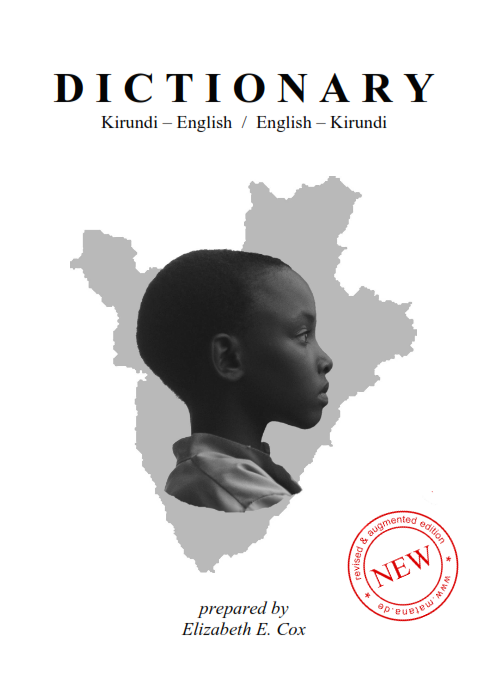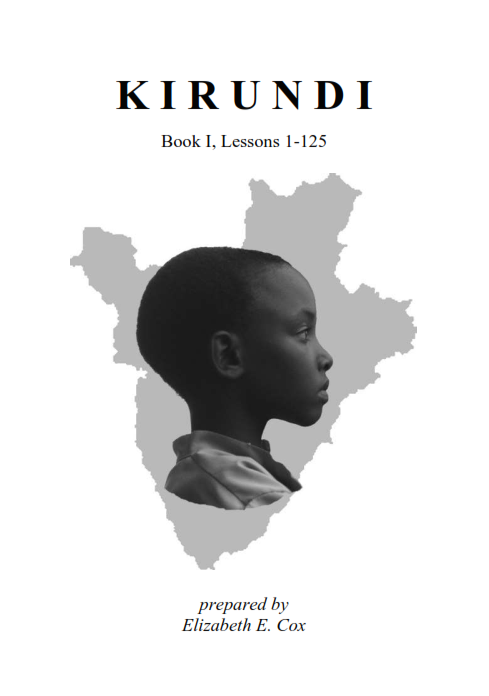rule ▶ (to) kugera, kugaba, kugānza, guhahaza
(kindly) kwengēnga
(try to in another's place) kurēngera
(kindly) kwengēnga
(try to in another's place) kurēngera
En-En dictionary
kurēngera (-rēngeye) v ▶ to take authority on oneself, to try to rule or act in another's place
try ▶ kugerageza, kugeza
(on clothes) kwīgera
(over and over in several places and ways) gutarataza
(to get out of work) gushaza
(to hinder from doing wrong) guhōyahōya
(to know something) kugenzūra
(to persuade) gukiranira
(to persuade in underhanded way) kubembeteranya
(repeatedly unseccessfully) kwānkika
(to rule or act in another's place) kurēngera
(to surpass another) guhiga
(on clothes) kwīgera
(over and over in several places and ways) gutarataza
(to get out of work) gushaza
(to hinder from doing wrong) guhōyahōya
(to know something) kugenzūra
(to persuade) gukiranira
(to persuade in underhanded way) kubembeteranya
(repeatedly unseccessfully) kwānkika
(to rule or act in another's place) kurēngera
(to surpass another) guhiga
En-En dictionary
kugaba (-gavye) v ▶ 1. to rule over, dominate, be master, 2. to be on guard, prepared for, 3. to pass out gifts
kugānza (-gānje) v ▶ to rule over, govern (past also njije)
ganza, sabwe! long live the king! (greeting to superior)
ganza, sabwe! long live the king! (greeting to superior)
kwīgaba (-īgavye) v ▶ 1. to rule oneself, be independent, 2. to do as one pleases
kwīganza (-īganje) v ▶ 1. to rule oneself, 2. to be independent, 3. to be emancipated
itegeko (ama-) 5 class 5
singular: i-,iri-
plural: ama- ▶ 1. command, 2. law, 3. rule
singular: i-,iri-
plural: ama- ▶ 1. command, 2. law, 3. rule
kwengēnga (-engēnze) v ▶ 1. to rule kindly, 2. deal kindly with, 3. to carry very carefully lest it break or spill, 4. to be gentle
guhahaza (-hahajije) v ▶ 1. to rule over, to dominate, 2. to mistreat, to oppress
barutungaboro 1 class 1
singular: umu-
plural: aba- ▶ 1. elders and rulers (esp. in regard to their function of helping the poor), 2. (in sing.) one who helps the poor
singular: umu-
plural: aba- ▶ 1. elders and rulers (esp. in regard to their function of helping the poor), 2. (in sing.) one who helps the poor
igiturire (ibi-) 4 class 4
singular: iki-,ic-
plural: ibi-,ivy- ▶ 1. food and drink of rich man (ruler), (esp. honey), 2. corruption
singular: iki-,ic-
plural: ibi-,ivy- ▶ 1. food and drink of rich man (ruler), (esp. honey), 2. corruption
itūntu (ama-) 5 class 5
singular: i-,iri-
plural: ama- ▶ 1. one who rules others, 2. cheekiness, 3. unwillingness to be told, 4. meanness
singular: i-,iri-
plural: ama- ▶ 1. one who rules others, 2. cheekiness, 3. unwillingness to be told, 4. meanness
kugabwa (-gabwe) v ▶ to be ruled, commanded
kugera (-geze) v ▶ 1. to command, rule, 2. measure, 3. reach a certain point, 4. to arrive, 5. to act as if to beat but not do it, 6. to be ready
kuvyāgira (-vyāgiye) v ▶ 1. to sit (of kings or rulers), 2. to be at rest (cows)
kuyoba (-yovye) v ▶ 1. to get lost, 2. to err in counting or in speaking, 3. to make a mistake, 4. to speak evil of ruler, 5. to break the law
umugabīsha (aba-) 1 class 1
singular: umu-
plural: aba- ▶ leader, ruler, captain
singular: umu-
plural: aba- ▶ leader, ruler, captain
umugezi (aba-) 1 class 1
singular: umu-
plural: aba- ▶ ruler, one who makes commands
singular: umu-
plural: aba- ▶ ruler, one who makes commands
umutegetsi (aba-) 1 class 1
singular: umu-
plural: aba- ▶ 1. administrator, 2. commander, 3. ruler, 4. dictator, 5. head, leader (from gutegeka)
singular: umu-
plural: aba- ▶ 1. administrator, 2. commander, 3. ruler, 4. dictator, 5. head, leader (from gutegeka)
elder ▶ umujēnāma, umukuru, umushīngantahe, umujanāma
(elders and rulers, esp. in regard to their function of helping the poor) barutungabōro
(elders and rulers, esp. in regard to their function of helping the poor) barutungabōro
En-En dictionary
evil ▶ ikibi, ububi, inābi
(adj.) –bi
(to speak ~ of) gukana, kunegura
(to speak ~ of one another) gucurikanya
(to speak ~ of a ruler) kuyoba
(to seek out ~ doer, witch doctor) kuragura
(to have witch doctor seek out ~ doer) kuraguza
(to sprinkle 'medicine' around house to protect it from ~) kurēmbeka, gutota
(to chase away ~ spirits) gusēnda
(to succeed in persuading someone to leave his ~ ways) gukōndōra
(speaking ~ of another with whom you work) ikēba
(~ deed) ubuhūmbu
(example) akābarore
(~ language, esp. young girl's) ubweruzi
(~ look) igitsūre
(adj.) –bi
(to speak ~ of) gukana, kunegura
(to speak ~ of one another) gucurikanya
(to speak ~ of a ruler) kuyoba
(to seek out ~ doer, witch doctor) kuragura
(to have witch doctor seek out ~ doer) kuraguza
(to sprinkle 'medicine' around house to protect it from ~) kurēmbeka, gutota
(to chase away ~ spirits) gusēnda
(to succeed in persuading someone to leave his ~ ways) gukōndōra
(speaking ~ of another with whom you work) ikēba
(~ deed) ubuhūmbu
(example) akābarore
(~ language, esp. young girl's) ubweruzi
(~ look) igitsūre
En-En dictionary
food ▶ indya, ibifungurwa, imfungurwa
(food that needs to be cooked) igitekwa
(baby ~) umusururu
(big portion of) irobe
(and drink of rich man, ruler) igiturire
(for a journey) impāmba
(without salt) ibise
(one in charge of ~ at a feast) umuteretsi
(place where ~ is plentiful) amasumo, ubusumo
(to be burned slightly) kuyēnga
(to become too dry in cooking) kuyēnga
(to burn, vi) kuzigira
(to dish up) kwārura
(to eat, to serve) gufungura
(to get ~ for oneself) gutāra
(to go to find ~) gusuma
(to go together to produce ~ for guests) gutērēra
(to quickly make ~ for one) kuzina
(to serve) gufungura
(to try to find ~ for unexpected guests) kwīyambagura
(food that needs to be cooked) igitekwa
(baby ~) umusururu
(big portion of) irobe
(and drink of rich man, ruler) igiturire
(for a journey) impāmba
(without salt) ibise
(one in charge of ~ at a feast) umuteretsi
(place where ~ is plentiful) amasumo, ubusumo
(to be burned slightly) kuyēnga
(to become too dry in cooking) kuyēnga
(to burn, vi) kuzigira
(to dish up) kwārura
(to eat, to serve) gufungura
(to get ~ for oneself) gutāra
(to go to find ~) gusuma
(to go together to produce ~ for guests) gutērēra
(to quickly make ~ for one) kuzina
(to serve) gufungura
(to try to find ~ for unexpected guests) kwīyambagura
En-En dictionary
poor ▶ (man) nyarucari
(person) umufafara, umufafare, umwōro
(elders and rulers, esp. in regard to their function of helping the poor) barutungaboro
(to be) gukena
(to become ~ after wealth) gucobogora
(person) umufafara, umufafare, umwōro
(elders and rulers, esp. in regard to their function of helping the poor) barutungaboro
(to be) gukena
(to become ~ after wealth) gucobogora
En-En dictionary
sit ▶ kwīcara
(to ~ fidgeting, or to go from place to place to ~ because others speak evil of you) kuyugayuga
(of kings or rulers) kuvyāgira
(together talking for a long time) gutūrika
(to fix up nice place to ~) gusēzera
(place to ~) icīcaro, umusēzero
(to ~ fidgeting, or to go from place to place to ~ because others speak evil of you) kuyugayuga
(of kings or rulers) kuvyāgira
(together talking for a long time) gutūrika
(to fix up nice place to ~) gusēzera
(place to ~) icīcaro, umusēzero
En-En dictionary
speak ▶ (speaking evil of another with whom you work) ikēba
(one who speaks with senseless repititions of words) ikirogorogo
(all speaking together) imvugarimwe
(to ~) kuvuga
(against) guhāririza
(carelessly) gufudika
(clearly) gufobōra, gutobekeranya
(distinctly) gutobora
(distinctly, not having been able to before) gutumbūra
(evil of one another) gucurikanya
(evil of) gukana, kunegura
(evil of the king) kurogota
(evil of a ruler) kuyoba
(fearlessly) kwūbahuka
(foolishly) kudebagura
(hatefully) gucobogoza
(hesitantlyusually used in negative) guhengēshanya
(in a mysterious language) gufobeka
(incoherently) kuvōvōta
(in someone's favor) gutēturura
(lightly) kujajura
(loudly) kurangurura, kurandamuka
(many words, usually quite meaningless ones) guhogōmboka
(sarcastically) kurtyekeza
(the truth) guhinyuza
(thoughtlessly) kurandamuka
(unwisely or rudely) kurofokwa
(very beseechingly) kubobōteza
(when one shouldn't) kuyogora
(where others hear voices but do not understand) guhwirima
(without arriving at point) kurerembuza
(to cause to) kuvuza
(to leave off speaking evil and speak kindly) kwigarura
(to prevent from speaking) guhwāmika
(give gift to bride so she will ~) guhorōra
(refuse to speak till given gift, as bride does) guhorōrwa
(one who speaks with senseless repititions of words) ikirogorogo
(all speaking together) imvugarimwe
(to ~) kuvuga
(against) guhāririza
(carelessly) gufudika
(clearly) gufobōra, gutobekeranya
(distinctly) gutobora
(distinctly, not having been able to before) gutumbūra
(evil of one another) gucurikanya
(evil of) gukana, kunegura
(evil of the king) kurogota
(evil of a ruler) kuyoba
(fearlessly) kwūbahuka
(foolishly) kudebagura
(hatefully) gucobogoza
(hesitantlyusually used in negative) guhengēshanya
(in a mysterious language) gufobeka
(incoherently) kuvōvōta
(in someone's favor) gutēturura
(lightly) kujajura
(loudly) kurangurura, kurandamuka
(many words, usually quite meaningless ones) guhogōmboka
(sarcastically) kurtyekeza
(the truth) guhinyuza
(thoughtlessly) kurandamuka
(unwisely or rudely) kurofokwa
(very beseechingly) kubobōteza
(when one shouldn't) kuyogora
(where others hear voices but do not understand) guhwirima
(without arriving at point) kurerembuza
(to cause to) kuvuza
(to leave off speaking evil and speak kindly) kwigarura
(to prevent from speaking) guhwāmika
(give gift to bride so she will ~) guhorōra
(refuse to speak till given gift, as bride does) guhorōrwa
En-En dictionary
rule found in: Kirundi I (Study lessons)
lesson 2 ▶ Ni and Si
lesson 8 ▶ Adjectives I
lesson 13 ▶ Class 4 iki–, ibi–
lesson 14 ▶ Class 4 iki–, ibi– (continued)
lesson 16 ▶ –ra Present Tense of Verb
lesson 18 ▶ Class 5 i–, ama–
lesson 29 ▶ Future Tense
lesson 39 ▶ –ngahe (How many?)
lesson 42 ▶ “To wash”
lesson 51 ▶ Ordinary Past Tense I
lesson 52 ▶ Rules for Past Endings
lesson 55 ▶ Negative of Ordinary Past
lesson 57 ▶ Object Pronouns I
lesson 76 ▶ Possessive Adjectives I
lesson 79 ▶ Causative Verbs II
lesson 80 ▶ Objects with Causatives
lesson 82 ▶ Gurtya, Gurtyo
lesson 86 ▶ Demonstrative Adjectives I
lesson 91 ▶ Dependent Clauses
lesson 97 ▶ Adjective –he?
lesson 98 ▶ Prepositional Form of Verb
lesson 102 ▶ Miscellaneous Words
lesson 114 ▶ Quotations, Direct and Indirect
lesson 123 ▶ Narrative Tenses I
rule found in: Kirundi II (Grammar)
chapter 16 ▶ Prefixless Past Tense
chapter 26 ▶ Special Verb Endings










 printable PDF files.
printable PDF files.

 This unique dictionary by Betty Cox is known for the deep cultural insight it provides to many Kirundi terms. It has been thouroughly revised, adapted to present-day Kirundi orthography rules and many new words and meanings have been added.
This unique dictionary by Betty Cox is known for the deep cultural insight it provides to many Kirundi terms. It has been thouroughly revised, adapted to present-day Kirundi orthography rules and many new words and meanings have been added. The Kirundi self study course guides you through 125 lessons and makes you learn both the necessary vocabulary and basic grammar.
The Kirundi self study course guides you through 125 lessons and makes you learn both the necessary vocabulary and basic grammar. English pronunciation by
English pronunciation by


